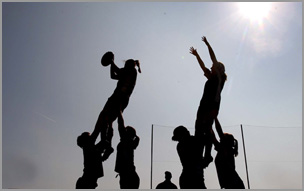Consistency key for referees
The number of yellow cards handed out at this World Cup has more than doubled since the last event. There have been 50 in...
Published by Alison Donnelly, September 3, 2010
5 minute read

First to the figures. So far a total of 50 yellow cards have been handed out in the 24 Women's Rugby World Cup matches to date, with Kazakhstan and South Africa receiving the most with seven apiece. The Kazakhs have also had the ignominy of being the only team to have seen red in this tournament.
In 2006 the figures were far lower. There were 18 yellow cards and no reds in the whole tournament with three teams (England, Canada and New Zealand) with zero cards.
Bernd Gabbei first of all explains how the disciplinary and referring process works at the competition.
We have a very thorough review process after every game. There is a performance reviewer watching each match and then afterwards there is a full session with feedback from the coaches of both teams involved as well as various officials and the referees input themselves as well.
Its a strong process which we started at the Junior World Cup and obviously there will be different views from various people but the common goal is to improve performances not just for the referees but for the teams as well.
He believes the marked rise in the number of offences is due in part to the speed at which the womens game is now played at the top level and the difficult some sides have in adjusting to rules which are designed to help the game flow faster.
Technically I think its important to note that the womens game and its standards has rapidly moved in four years so we cant really compare things like discipline at this World Cup with the last one. The womens game at the highest level is fast and very competitive and these games are being refereed to exactly the same standards as the mens game. There is less tolerance of offences and the directive is to allow quick play. Thats the same all over the world in the game at the moment and well be using all of the stats data after this World Cup to give teams an idea of what they need to work on.
We have been offering all teams sessions with referees throughout the World Cup, some took us up on it some didnt but weve got to keep up a consistent standard and not allow teams to slow the game down.
Gabbei agrees that the recent game between South Africa and Kazakhstan which saw seven yellow cards and a red was a disappointment.
Nobody here is happy with a game like that. The referee himself was far from happy either he was almost depressed! But we do need to be strict across the board and we will look to work with some of these nations who are not at the top of the womens game and maybe get less matches to be sure they know the direction the game is going.
Susan Carty, the IRBs Womens Development Manager is pleased with the standard of referring seen at the tournament.
This is very much part of our overall womens rugby strategy at the IRB. We want to create very clear pathways for anyone to get involved in the game in all areas to be able to reach their potential whatever that may be and I think we are achieving that.
The IRB last year also provided greater funding to ensure that all referees taking part in the WRWC picked up vital experience this year.
We worked very hard this year in ensuring that all of the referees who were coming to the World Cup had plenty of matches in the build-up. We worked with the various unions who were hosting the warm-up games and we paid for the referees to go there and get the game time. Thats been a real benefit and that was a big step for us which I think is showing in the standard weve seen generally.
Meanwhile Sarah Corrigan from Australia has been handed the honour of refereeing the World Cup Final this Sunday.